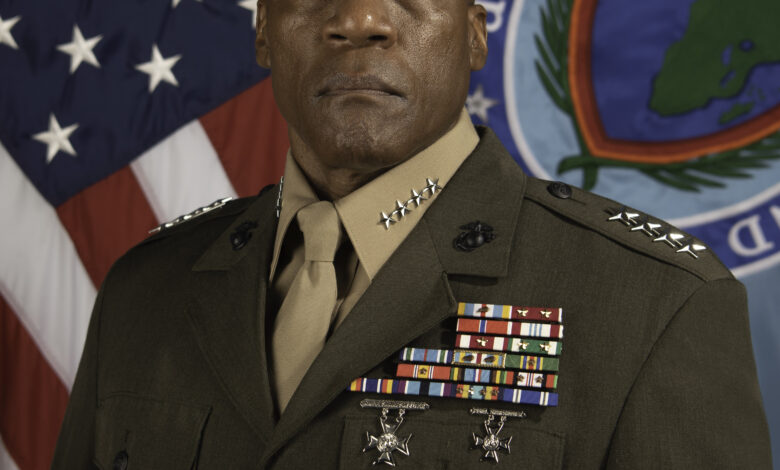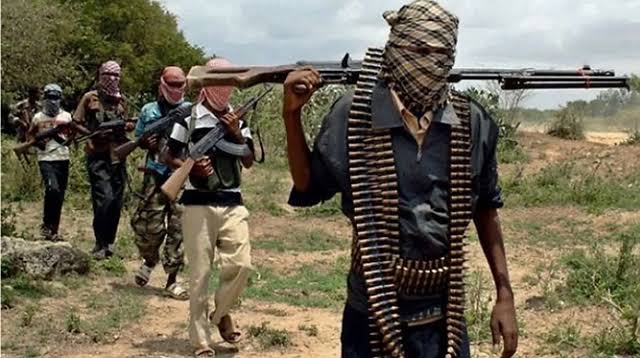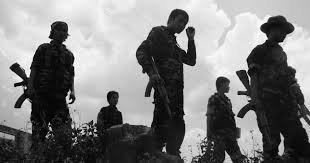Terrorists target Nigeria, West Africa coastlines, says United States

Lagos, Ondo and Ogun may be affected
By Ologeh Joseph Chibu
Terrorists are targeting the Nigerian coastlines, the Commander of the United States Africa Command (AFRICOM), General Michael Langley, has said.
Ondo and Lagos State have the longest coastlines in Nigeria indicating the two states are at high risk of terrorist attacks.
The US official said the terrorists also target the West African coastline.
He said the terrorists want the coastlines for easy access to weapons, drugs and also to enhance trade.
Ondo has the longest coastline in Nigeria with some 180km outreach. Three South West States of Ondo, Lagos and Ogun are indicative targets in the new finding.
He issued the stark warning indicating increasing efforts by terrorist and extremist groups in the Sahel to gain access to West Africa’s coastal regions.
He spoke at a press conference during the African Chiefs of Defence Conference held in Nairobi, Kenya, from May 28 to 29, 2025.
Langley described the recent wave of attacks across Nigeria, the Sahel, and the Lake Chad Basin as “deeply concerning,” warning that coastal access would significantly enhance terrorist capabilities in arms trafficking and smuggling.
“The scale and brutality of some of these incidents are troubling. So, we’re monitoring this closely,” Langley said.
Mali, Burkina Faso, and Niger are widely considered the epicentre of terrorist activity in the Sahel, with Burkina Faso in particular hosting entrenched insurgent networks affiliated with ISIS and Al-Qaeda.
The 2025 Global Terrorism Index, published by the Institute for Economics and Peace, reported that the Sahel accounted for 19 percent of all terrorist attacks globally in 2024 and was responsible for 51 percent of terrorism-related deaths worldwide—an increase from 48 percent in 2023. Five of the ten countries most affected by terrorism are located in the region.
Langley underscored U.S. concerns that terrorist infiltration of the coastline would pose direct threats not only to African nations but also to American interests.
“One of the terrorists’ new objectives is gaining access to West African coasts. If they secure access to the coastline, they can finance their operations through smuggling, human trafficking, and arms trading,” he said. “This puts not just African nations at risk, but also increases the chance of threats reaching the US shores.”
He urged coastal West African countries—including Ghana, Côte d’Ivoire, and Benin—to remain vigilant in securing their northern borders from extremist infiltration.
“That’s why our coastal partners – Ghana, Côte d’Ivoire, and Benin – are fighting fiercely along their northern borders to prevent terrorist expansion, and US AFRICOM is standing with them,” he stated.
Langley also acknowledged that the partial withdrawal of U.S. troops from parts of Africa had affected Washington’s ability to monitor and respond to extremist threats as effectively as before. Nonetheless, he reiterated the U.S. commitment to counterterrorism cooperation, while respecting the sovereignty of partner nations.
“We respect nation sovereignty and only go where we’re asked as long as it aligns with U.S. national security objectives,” he said.
Reflecting on his November 2024 visit to Nigeria, Langley noted that the trip offered insight into U.S. support for Nigeria’s defence strategy against Boko Haram and ISIS West Africa.
“During my visit, I sat with Nigerian defence leaders to understand how we can help. The US acts with its partners—and in Nigeria’s case, we work together to combat Boko Haram and ISIS West Africa in pursuit of regional security,” he said.
“We are committed to supporting one of the most capable militaries in the region—Nigeria’s. Although our withdrawal has reduced our ability to monitor some developments directly, we maintain strong liaison and provide support where possible,” he added.
Addressing efforts to reengage with military-led governments, Langley revealed that dialogue with Burkina Faso remains a priority, despite strained relations.
“The US seeks opportunities to collaborate with Burkina Faso on counterterrorism challenges. I invited Burkina Faso’s chief of defence to the African Chiefs of Defence Conference because I believe in maintaining that dialogue. So, it’s still open,” he said.
Turning to East Africa, Langley highlighted the uptick in AFRICOM’s operations in Somalia in response to renewed requests from the Somali government.
“At the request of the Somali government, we’ve conducted over 25 airstrikes this year alone—twice as many as last year—targeting jihadist groups,” he revealed.
Despite the complex security landscape, Langley praised African military forces for proactively confronting their challenges.
“African militaries are not waiting to be saved. African militaries are taking on security challenges head-on, and leverage opportunities for their nations to achieve stability and prosperity,” he said.
“So right now, as I speak to you, they continue to step up and take control of their futures.”
Langley emphasized that AFRICOM’s overarching goal is to foster long-term, sustainable partnerships that enable African nations to lead their own security responses.
“Our goal is to deepen partnerships that empower African nations to solve African problems—not with handouts, but through trusted collaboration,” he said.
“A safe, stable, and prosperous Africa is not a charitable goal. It’s a strategic necessity for the United States and our African partners.”
He noted that AFRICOM continues to invest in joint military exercises designed to strengthen crisis response capabilities, improve interoperability, and build independence among African forces.
“We are not just helping build military capacity; we’re helping create the stability that underpins African and American prosperity alike,” he said.
“AFRICOM is increasingly focused on helping our partners address the root causes of terrorism—instability at the local level—through intelligence sharing, capacity building, and institutional strengthening.”
Langley concluded by reiterating AFRICOM’s central mission.
“AFRICOM aims to support African nations in building the self-reliance needed to confront terrorism and insurgency by assisting in building strong, capable military and security forces,” he said. “Our partnership is summed up in three words: peace through strength. Strong partnerships are the best representation of that thought because we’re always stronger when we stand together.”





